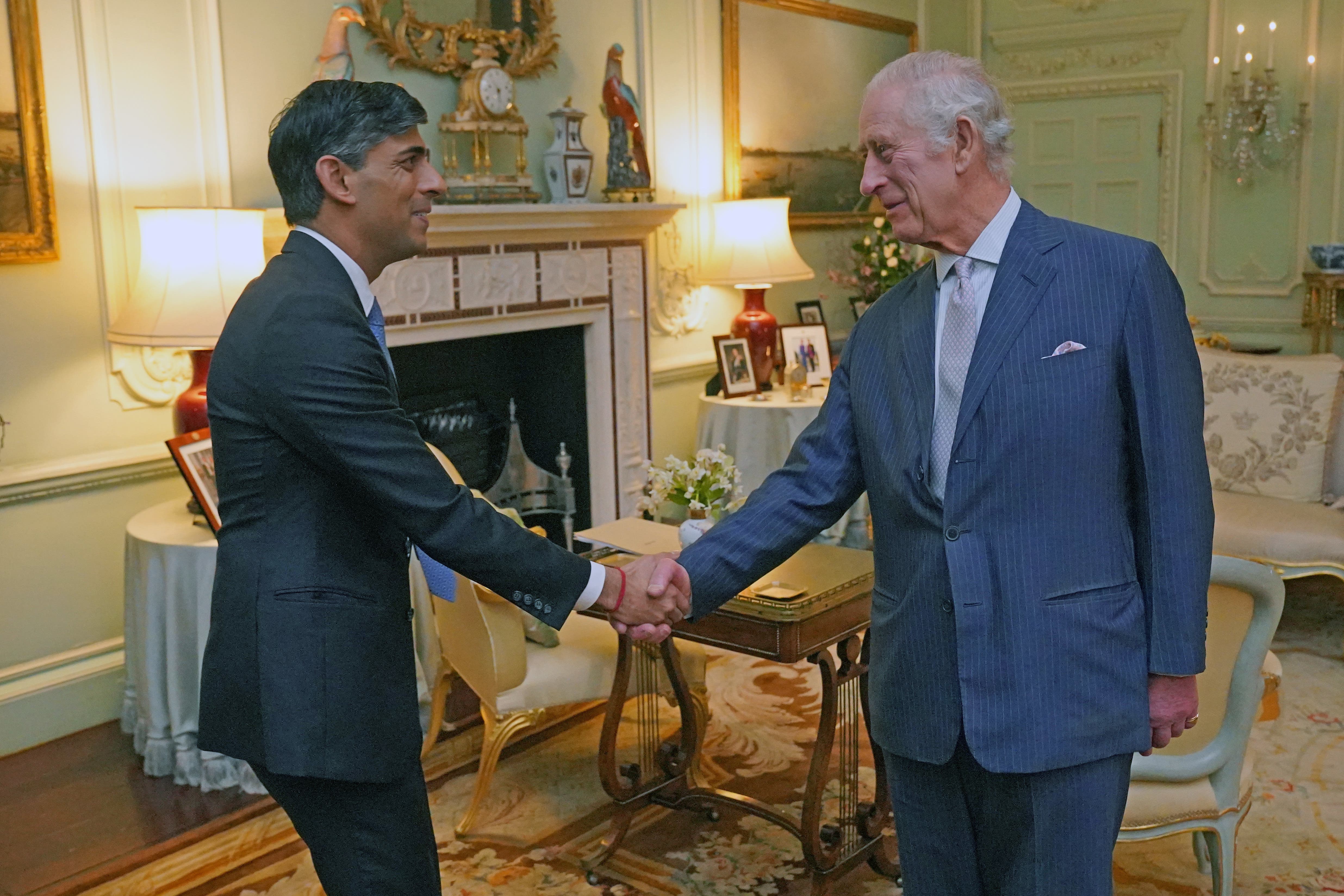King back at work with first Privy Council and PM audience since cancer revealed
Charles met Rishi Sunak at Buckingham Palace on Wednesday afternoon – their first in-person audience of the year.

The King has held his first face-to-face official duties – an audience with Prime Minister Rishi Sunak and a Privy Council – since being diagnosed with cancer.
Charles met Mr Sunak at Buckingham Palace late on Wednesday afternoon, marking the restart of their weekly encounters to discuss matters of Government.
Beforehand, the monarch held an in-person Privy Council at the royal residence, where attendees included Lord President of the Council Penny Mordaunt and a selection of other ministers who are Privy Counsellors.
It is the first time the 75-year-old King, who was pictured with the Prime Minister, has been filmed carrying out official duties since his shock diagnosis, and since the start of the year, but the head of state remains away from public engagements.
Mr Sunak told the King “the whole country” was behind him, while the monarch spoke of being reduced to tears by the kindness of the messages and card he had received.
Charles, wearing a suit and tie, was seen shaking hands warmly with Mr Sunak, and greeting him with a broad smile.
Mr Sunak said: “Good evening Your Majesty. Very nice to see you.”
The King replied: “A gap”.
Mr Sunak said: “A bit. Wonderful to see you looking so well.”
Charles joked: “It’s all done by mirrors”, prompting hearty laughter from Mr Sunak.
The Prime Minister added: “We’re all behind you. The country is all behind you.”
Charles replied: “I’ve had so many wonderful messages and cards. It’s reduced me to tears most of time.”
Mr Sunak said: “Well I can imagine.”
They discussed the spotlight that has been shone on cancer charities, with the King describing the organisations as “wonderful”.
The King, who has been dealing with his red boxes of state papers behind the scenes, started outpatient treatment for an undisclosed form of cancer just over two weeks ago.
Mr Sunak was introduced into the Private Audience Room by the King’s new equerry, Lieutenant Commander Will Thornton of the Fleet Air Arm, who was making his formal debut in the role.
His popular and trusted predecessor, Lieutenant Colonel Jonny Thompson, has been promoted to senior equerry to the King and Queen – a more executive and less public-facing role.
Mr Sunak, who previously revealed the King’s illness had been “caught early”, telephoned Charles at Sandringham to wish him well two days after his health condition was announced to the nation.
It was a busy afternoon for the King on Wednesday, with the Privy Council – the oldest form of legislative assembly still functioning in the UK – beginning at 4.30pm.
Traditionally, the King and Privy Counsellors stand throughout – a custom initiated by Queen Victoria after the death of Prince Albert when she wanted to speed up proceedings and reduce her public duties.
Buckingham Palace has yet to comment on whether the King stood for the meeting.
The Privy Council website reads: “Etiquette does not allow sitting while the Sovereign is standing. To this day even The King stands at a PC meeting.”
At each gathering which usually takes place monthly, the Council, which is held in private, obtains the King’s formal approval to orders which have already been discussed and approved by ministers.
He also approves proclamations – which are formal notices covering issues such as the summoning of a new parliament, coinage and the dates of certain bank holidays.
At 5.45pm, the King met Mr Sunak, following Prime Minister’s Questions in the House of Commons, as is tradition.
There will have been much to discuss during the private one-to one, which came a day after the King’s son and heir the Prince of Wales risked controversy by issuing a strongly worded plea for peace in Gaza.
Charles, who only acceded to the throne 17 months ago, has faced a difficult start to 2024, with a three-night hospital stay for a procedure on an enlarged prostate, during which time his cancer – not prostate cancer – was discovered.
Meanwhile, his daughter-in-law the Princess of Wales is recovering after major abdominal surgery, but is not expected to be back on official duties until after Easter.
Last year following the Christmas break, the King held his first audiences of the year with Mr Sunak on January 31.
In October 2022, the King famously welcomed the then-prime minister Liz Truss to an audience with the words: “Back again? Dear oh dear.”
The audience can take place over the phone, with Charles and Mr Sunak speaking on February 22 last year while the Prime Minister was dealing with post-Brexit negotiations on the Northern Ireland Protocol.
Queen Elizabeth II switched to telephone calls with Boris Johnson during the Covid pandemic.
In a 1992 documentary filmed to mark her 40th year on the throne, the late Queen gave her view on the importance of the meetings with her PMs.
“They unburden themselves or tell me what is going on or if they have any problems, and sometimes I can help in some way as well,” she said.
“They know I can be impartial and it is rather nice to feel one is a sponge.
“Occasionally one can put one’s point of view and perhaps they have not seen it from that angle.”
As head of state, the King must be politically neutral and act on the advice of his Government in political matters, but he can advise and warn his ministers including the PM.
Bookmark popover
Removed from bookmarks